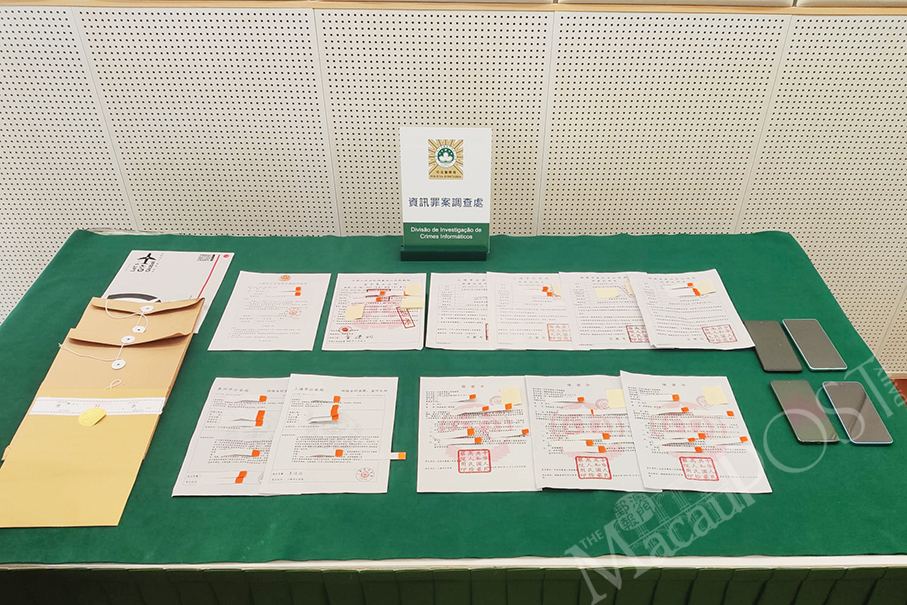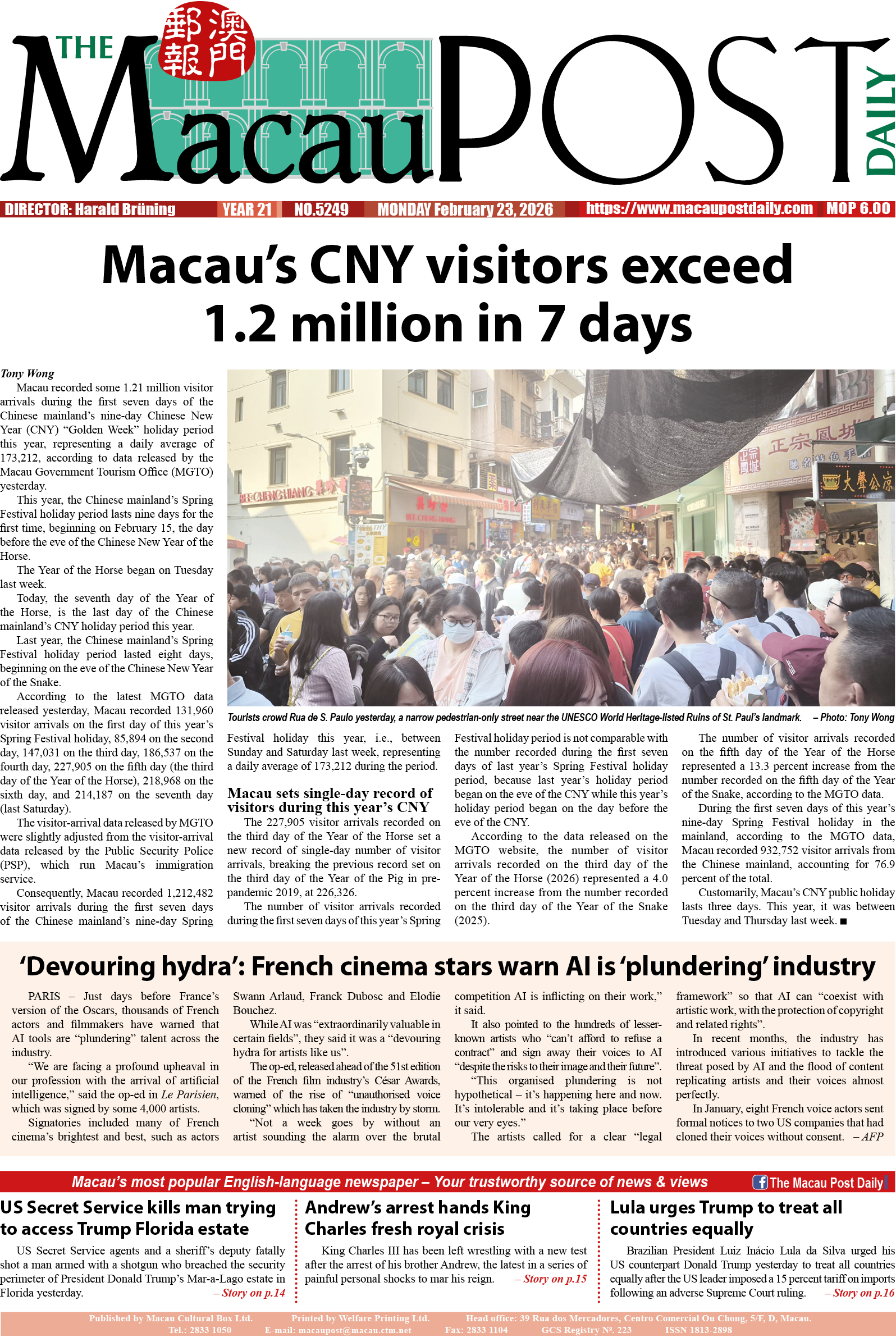Editorial
I greeted the start of our city’s consolidation period in fighting the current outbreak of COVID-19 by having a haircut at 1 a.m. on Saturday.
That’s our treasured Macau.
I had heard through the grapevine in the middle of last week that some business-savvy hairdressers were planning to reopen their salons at the stroke of midnight on Saturday, the official start of the consolidation period. Then an acquaintance told me that one of the 50-pataca-per-haircut barbershops in the Horta da Mitra area – one of my favourite neighbourhoods – was one of the hair salons that would definitely be back in business as soon as legally allowed.
Initially, I suspected that it was just the typical urban myth circulating on social media but after giving it some thought I decided to check it out, and bang there it was – a barbershop well after midnight doing a roaring business. There was a queue of five in front of me. The barber insisted that everyone follow all the regulations – venue code, KN95 facemask, temperature check.
The great thing for a buzz-cut guy like me about those 50-pataca barber shops is that it’s all over in a jiffy – in less than 10 minutes.
Not having been able to have a haircut was one of my personal grievances during the past few weeks. The result was that I finally looked like an ageing hippie. Now, at least on the hair front, it’s back to normal.
Slowly but gradually, our city is returning to some semblance of normality. That’s the prize we won after toughing it out and demonstrating our stamina during the past few weeks’ somewhat nerve-racking restrictions on people’s movements and business operations.
Thanks to the government’s dynamic zero-COVID approach Macau so far has been able to get through the current outbreak without a major increase in fatalities and the seriously ill.
Sad to say, Macau’s first novel coronavirus deaths since January 2020, when the first case was diagnosed locally, occurred during the current outbreak. The six victims were senior citizens afflicted by chronic illnesses, among them a centenarian. While they were of advanced age, their passing was triggered by COVID-19. I do not agree with those who say that old people dying of the nasty virus was no big deal as they would have passed away anyway. Well, one day we are all passing away “anyway”, but particularly for an elderly person the chance of still being around for a few more years or perhaps even just a few more months does matter.
No doubt, COVID-19’s BA.5.1 is a particularly nasty fellow affecting our health and even endangering our lives, menacing the elderly and the chronically sick in particular. That’s why even more attention ought to be paid by the health authorities to the protection of especially vulnerable groups.
The protection of everyone’s health and life must remain the overriding aim of the local government’s approach towards the COVID-19 menace. A sound economy needs healthy people to run smoothly.
Health protection measures during extraordinary times such as the COVID-19 pandemic do call for tough measures that occasionally may turn out to be moot, such as when the Health Bureau ordered mandatory nucleic acid tests (NATs) for Macau’s 30,000-strong Philippine community, which includes some 26,000 non-resident workers (NRWs), while the remainder are local residents. The NATs targeting Macau’s biggest foreign community began on Friday and ended yesterday.
I understand that the decision was not taken lightly by the government. It was triggered by the fact that during the current outbreak Philippine nationals account for nearly 10 percent of Macau’s COVID-19 cases and, even more worryingly, for about one-quarter of the cases in the past fortnight (as of middle of last week). Some 13,000 domestic helpers are from the Philippines, about 55 percent of the city’s total number of maids.
Philippine nationals account for some 4.5 percent of the population. They are the biggest group of foreign NRWs (about 110,000 NRWs are from the Chinese mainland who, of course, aren’t foreigners in Macau).
I doubt whether Macau’s economy could function without our multiskilled Philippine friends, although they only account for around 16 percent of Macau’s NRWs. That’s because, unlike other foreign NRW groups, Filipinos work in a wide range of occupations and professions in Macau, and for a variety of reasons they have closer contacts with the local expatriate community than their fellow NRWs. I assume that’s also one of the reasons why some expatriates have been particularly vociferous in their rejection of the government’s decision to declare the Philippine community a high-risk key group in its testing drive. Regrettably, some of the detractors have accused the authorities of racial discrimination. Sorry, that’s pure bunk.
Thank goodness, the Philippine Consulate-General poured cold water on the discrimination claims, first in a Tagalog statement on Thursday and then another one in English on Saturday. The consulate underlined that the local government had previously classified other nationalities as high-risk key groups ordered to undergo NATs (those from Vietnam, Myanmar and Nepal), and the consulate urged its compatriots not to politicise the government’s “directive that is purely a health issue” and to get tested “for a limited period of days” – which turned out to be three consecutive days.
“Are we Filipinos better than our sisters and brothers from our neighbour countries just because we have a significant number in Macau?”, the consulate asked rhetorically.
The consulate’s responsible attitude towards the matter is laudable.
I would like to urge everyone in Macau to act as keen consolidators to help the government bring its battle against the crafty BA.5.1 subvariant to an expeditious solution so that we can all move on to the next stage of getting to grips with COVID-19. However, we should realistically expect that the novel coronavirus will remain a public menace “forever and a day” – to quote Shakespeare.
The challenge now is to develop medicines and vaccines able to outsmart the virus, namely by preventing long COVID health issues that could devastate whole economies.
The consolidation period can only achieve its desired aim when government and civil society work hand in hand. Anyone with a modicum of mother wit should know that.
– Harald Brüning







